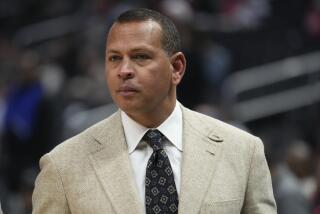Nixon’s Nephew Explains Visit to Vesco in Cuba : Venture: Donald Nixon Jr. says that before his house arrest he was working through the fugitive financier on a ‘miracle drug’ to treat AIDS.
- Share via
IRVINE — The late President Richard Nixon’s nephew Donald Nixon Jr., who was held under house arrest in Havana while Cuban officials investigated his ties to fugitive financier Robert Vesco, said Wednesday he believes that authorities might have been after a “miracle drug” that he and Vesco were testing.
Nixon, 49, said he had been working through Vesco with the Cuban government for three years to test a spinoff of the controversial anti-AIDS drug Viroxan, a citronella-based substance that he believes cured his wife of breast cancer and arthritis. Nixon was detained for 30 days in a Havana hotel room. Although Cuban authorities did not arrest him, they did not give him permission to leave until Sunday.
At a press conference at his attorney’s office in Irvine, Nixon said he was detained on May 31, the same day that Vesco was arrested on charges of being a foreign agent. Nixon had been a guest in Vesco’s Havana home and was in a venture with Vesco to develop an “immune adjuvant” drug to combat AIDS and other illnesses.
“After three years of creating the basic elements for double-blind clinical trials in humans in six countries, as well as completion of Cuba’s research, [Cuban laboratories] were able to produce the product at relatively low cost,” Nixon said in a prepared statement. “However, interestingly enough, two weeks after the purest material was produced, the people from counterintelligence came into Vesco’s home and immediately took him away.”
Nixon said he doesn’t believe that Vesco was a foreign agent. Vesco “had nowhere to go,” Nixon said. “There was no reason for him to break the law.”
Nixon’s theory is one of the first set forth outside of Cuba to explain why the Cuban government would arrest the 59-year-old Vesco after allowing him to live in the country for 12 years. Vesco fled the United States for Costa Rica in 1972 after the Securities and Exchange Commission charged that Vesco had diverted more than $220 million from four mutual funds.
*
Local experts disagree that the anti-AIDS drug could be, as Nixon puts it, “a medical breakthrough.” “I am open-minded,” said Dr. Donald Forthal, an infectious diseases expert and assistant professor of medicine at UCI, “but am skeptical about this.” Forthal, who does research on viruses such as HIV and measles, said he thought a citrus-derivative might help some conditions, but it would not have a significant impact. “High doses of vitamin C don’t have much of an effect on a common cold,” Forthal said.
The drug’s predecessor, Viroxan, was widely criticized after its inventor, an Orange County physician, administered the drug to AIDS patients. Although touted as a cure, the homemade substance hastened the deaths of at least two AIDS patients, according to state medical officials. The physician, Stephen Herman, agreed to surrender his medical license in 1991 after state prosecutors agreed to drop civil charges of gross negligence, incompetence, dishonesty and other offenses, according to his attorney.
Viroxan was also the subject of the first AIDS medical fraud case to come trial in the United States. A Los Angeles Superior Court jury ordered two doctors and a hospital that used the drug to pay five patients a total of $2.7 million last July. Herman was dropped from the lawsuit when he filed for bankruptcy, but continued to pursue the development of the drug with Nixon’s help.
Herman told The Times in 1992 that the younger Nixon had helped him negotiate a marketing agreement with China for Viroxan-based soap.
Nixon dismissed the controversy about Viroxan, saying it was created by the media. When told the complaints came from state medical investigators, he said: “All that’s been thrown out” because his new drug had been altered by “a trade secret.”
*
Nixon said it would cost $300 million to test the drug in the United States. He said when the Clinton Administration and federal officials expressed no interest in the drug, he formed a venture with Vesco and partners from Colombia, Mexico, Switzerland and Italy. Nixon said the drug has been tested in Colombia, Italy, Switzerland, Russia, Mexico and Cuba. He also said his wife had taken the drug for six years, ever since chemotherapy for breast cancer left her with arthritis.
Nixon said little about his relationship with Vesco at the news conference. He said he lived with Vesco for five years in the early 1970s. Nixon subsequently married and his family moved to Tustin. He said hadn’t spoken to Vesco for 14 years until he needed help testing the drug, which he calls TX.
Nixon said he has not seen or heard from Vesco since the financier’s arrest. As for the drug, he said, “At this time, the project to my knowledge has stopped and I have no knowledge that the Cubans will continue.”
More to Read
Sign up for Essential California
The most important California stories and recommendations in your inbox every morning.
You may occasionally receive promotional content from the Los Angeles Times.












